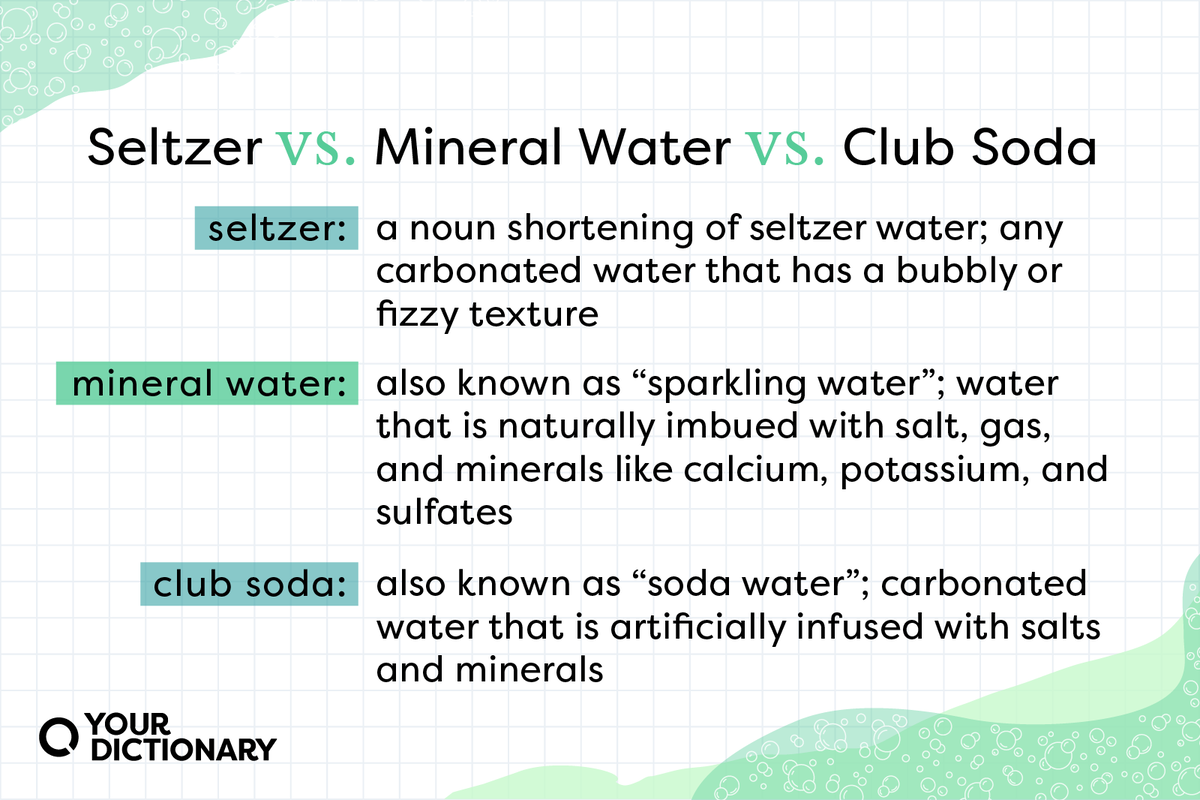
Seltzer, club soda, and mineral water all have their uses, and most people that love one also love the others. You can use all three in mixed drinks and recipes or enjoy them alone too.
But what exactly is the difference in meaning between these watery terms? Learn exactly when to bust out each bubbly beverage below.
What Does “Seltzer” Mean?
The term seltzer (SELT-ser) describes any carbonated water that has been pressurized with carbon dioxide to give it a bubbly or fizzy texture. Think of seltzer as “soda water” or “sparkling water.”
Seltzer is a shortened version of seltzer water. The phrase seltzer water is kind of redundant, though, with seltzer already referring to water.
- My favorite seltzer brands are the ones with a subtle fruity taste.
- I love a cold seltzer after a long day in the sun.
- My cocktail of choice is gin and seltzer with a hint of lime.
You can enjoy seltzer by itself as a beverage, sometimes flavored slightly with fruit juices or essences like the popular canned seltzers La Croix and Spindrift. Some recipes, particularly in cake baking, call for seltzer to add extra air and fluffiness to the finished product.
The Origin of the Word “Seltzer”
The word seltzer comes from the German town of Nieder-Selters, one of the first places in the world to produce and sell naturally carbonated water.
(Ironically, the waters of Nieder-Selters are actually mineral water by modern standards, not seltzer.)
Fast Fact
Despite comprising words with French origin La (luh), meaning “the,” and Croix (kwah), meaning “cross,” the creators behind La Croix named the beverage after the St. Croix river in Wisconsin, which over time became Americanized to be pronounced (seynt croy).
The proper way to pronounce La Croix is is "luh croy," much to some French enjoyers’ chagrin.
What Does “Mineral Water” Mean?
Mineral water, sometimes called spring water, contains natural salt, gas, and minerals such as calcium, potassium, and sulfates. This combination gives mineral water a naturally salty, bitter, or sour taste.
- The benefits of mineral water come down to the taste, but I love it!
- I drink mineral water every day because I don’t like the taste of tap water.
- My favorite mineral water has a little bit of lime flavor.
The leading brands of mineral water are Perrier, which comes from a natural spring in France of the same name, and San Pellegrino, sourced from the Pellegrino region of the Italian Alps.
Sparkling Water vs. Mineral Water
Like seltzer (sparkling water), mineral water can also be effervescent (sparkling) due to its bubbles. However, the bubbles in mineral water are natural gas bubbles, unlike the added carbonation of seltzer.
The natural essence and increased number of additives also separate mineral water from seltzer in how they taste before being flavored. Because minerals from the earth naturally flavor mineral water, it’s often sold as a premium alternative to pure water.
What Does “Club Soda” Mean?
Club soda is carbonated water artificially infused with salts and minerals, usually potassium bicarbonate and potassium sulfate.
- I’m watching my calories, so I’ll stick with club soda.
- I was able to lose weight by switching from sugary sodas to club sodas.
- To make a good mojito, add the club soda last.
The club in club soda refers to the Cantrell & Cochranes Club in Dublin, Ireland, that initially served the merry mixture in the 1800s.
Club Soda vs. Mineral Water
Club soda and mineral water serve the same purpose, though mineral water naturally contains with minerals and gasses.
Club soda is artificially mixed, giving greater control over the flavor profile (though perhaps a more artificial taste).
Soda Water vs. Club Soda
Another term you may have heard discussed in comparison to seltzer, mineral water, and club soda is soda water.
Soda water and club soda are one and the same (though many people also use soda water to describe seltzer).
Fast Fact
Like Band-Aid vs. bandage or Jell-O vs. gelatin, club soda vs. soda water is an example of metonymy — when one word (in these cases, a brand name) becomes synonymous with what it represents.
The generic term club soda comes from the popular soda water brand Club Soda, which became so popular that the name became a catchall for soda water.
Quick Tips To Remember the Difference
Knowing the differences between seltzer, mineral water, and club soda is important when shopping for alternatives to plain water, and it can also help you reap the benefits of each.
- Seltzer is fizzy water that can add punch to your drinks and keep you hydrated.
- Mineral water contains natural minerals like magnesium and calcium that can benefit your health.
- Club soda is a cheaper alternative to mineral water, and its infused sodium levels can be beneficial for replenishing electrolytes.
What about Tonic Water, Spring Water, and Hard Seltzer?
Tonic water is also a standard alcohol mixer, but unlike those mentioned above, tonic water (shortened to tonic) is heavily flavored and known for its bittersweet taste. It is a carbonated mixture of water, quinine, and sweetener (such as sugar or corn syrup).
Any water taken from a natural spring is spring water. While most mineral waters come from springs, not all spring waters are mineral waters.
Hard seltzer refers to a type of packaged alcoholic beverage containing seltzer. Often, hard seltzers are flavored with fruit juice or essence and include malt liquor or other neutral liquors.